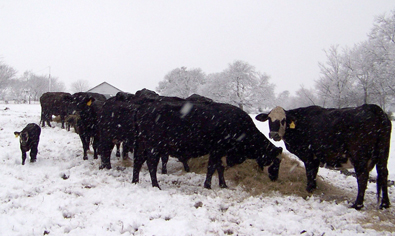
Agricultural News
Be Prepared for Colder Weather this Winter
Fri, 02 Dec 2011 15:08:19 CST
 Stocker cattle producers have many challenges to manage: animal health, increasing costs of inputs and fluctuating cattle prices. According to Bryan Nichols, Ag Research Associate at the Noble Foundation, however, one of the most difficult challenges may be Mother Nature. A Noble Foundation research project that began in late 2010 proves this point.
Stocker cattle producers have many challenges to manage: animal health, increasing costs of inputs and fluctuating cattle prices. According to Bryan Nichols, Ag Research Associate at the Noble Foundation, however, one of the most difficult challenges may be Mother Nature. A Noble Foundation research project that began in late 2010 proves this point.
The project was to evaluate the potential of a new mineral supplement on stocker cattle health and performance. In December 2010, research pastures were stocked at one head per acre with the stocking rate increased to two head per acre in the spring. The treatment was administered weekly and poloxalene, an anti-bloating agent, was provided in blocks. Animals were backgrounded according to industry standards prior to the study, and weights were recorded every 28 days.
On day 61 of the study (Feb. 1), a winter blast hit the study site. We woke up that morning to snow, ice and 10 degree Fahrenheit temperatures. By Feb. 4, snow and ice forced destocking of the pastures. To maintain animal health and the study's integrity, animals were held in a common bermudagrass pasture, offered free-choice bermudagrass hay and limit-fed alfalfa hay at 15 pounds per head per day until the weather improved. On Feb. 11, conditions improved enough that cattle were placed back on their respective pastures, and the study resumed.
As expected, the stress of the winter storm significantly affected performance. When analyzing the results, we were surprised at the extent to which the bad weather had depressed animal performance. Even more surprising was the length of time (two weeks) it took the cattle to recover. This study provides a good illustration of why being prepared for bad weather is critical.
The stress incurred by cattle during this storm is not unlike the stress experienced during weaning. Many of the same guidelines apply in both instances. Immunity levels must be high for cattle to withstand high stress events; therefore, the vaccination protocol used when receiving these cattle is critical. Research has demonstrated that adequate mineral levels are needed to achieve optimal animal immunity. Offering a good quality mineral supplement at all times to stocker cattle grazing winter pasture will help to maintain the proper mineral balance.
In the event that cattle are unable to graze, good quality hay will be needed. The 2011 drought has made any type of hay difficult to find as well as very expensive. Do not wait to locate hay until it is too late.
As the temperature falls below the lower critical temperature (LCT) for beef cattle, energy requirements increase. Cattle that have grown a winter coat and are able to remain dry have a LCT of 32 degrees. For every degree below the LCT, energy requirements increase 1 percent. For example, a steer gaining only 1 pound per day with an outside temperature of 10 degrees requires a diet containing 72 percent total digestible nutrients (TDN). Good quality grass hay contains 50 to 55 percent TDN, so cattle experiencing these conditions will probably only maintain or even lose some weight. In most cases, bad weather conditions last only a short time before grazing can continue. If bad conditions persist, however, energy supplementation may be needed to maintain acceptable animal performance.
Supplementation may come from one or more byproduct feeds such as soyhulls, dried distillers grains, corn gluten feed or other products that are available locally. Even if grazing is quickly resumed, animal performance will likely continue to suffer for an additional two weeks. The Noble Foundation encourages stocker operators to manage their animals after a significant weather event as if they were still stressed. Closely monitor animals for poor health and decreased forage consumption, and treat accordingly.
Our thanks to Bryan Nichols for providing this article on preparing for winter from the Noble Foundation.
WebReadyTM Powered by WireReady® NSI
Top Agricultural News
More Headlines...



















